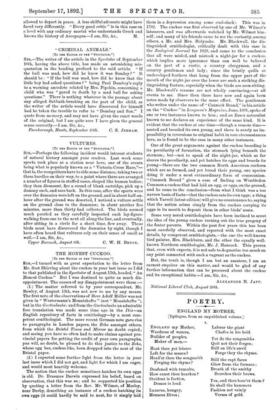THE HONEST CUCKOO.
[To THE EDITOR OF THE " SPECTATOE."]
SIR,—I turned with as great expectation to the letter from Mr. Scot Skirving about the cuckoo in your last issue as I did to that published in the Spectator of August 13th, headed, "An Honest Cuckoo." But I was destined to quite as much dis- appointment. The causes of my disappointment were these :— (1.) The matter referred to by your correspondent, Mr. Bowley, of August 13th, was not new to me by any means. The first note of the observations of Herr Adolf Muller was not given in " Westermann's Monatsbefte " (not " Moaatshefte "), but in the Gartenlaube; and from the Gartenlaube an admirable free translation was made some time ago in the Ibis—an English repository of facts in ornithology—by a most com- petent ornithologist. The more recent German note gave rise to paragraphs in London papers, the Echo amongst others, from which the Bristol Times and Mirror no doubt copied ; and seeing you have so often had to make claims against pro- vincial papers for getting the credit of your own paragraphs, you will, no doubt, be pleased to do this justice to the Echo, whose egg has, cuckoo-like, been dropped into the nest of the Bristol paper.
(2.) I expected some further light from the letter in your last issue which I did not get, and light for which I am eager, and would most heartily welcome.
The notion that the cuckoo sometimes hatches its own eggs is old. Dr. Erasmus Darwin expressed his belief, based on observation, that this was so ; and he supported his position by quoting a letter from the Rev. Mr. Wilmot, of Morley, near Derby, describing an instance of a cuckoo hatching its own eggs (it could hardly be said to nest, for it simply laid
them in a depression among some coal-slack). This was in 1792. The cuckoo was first observed by one of Mr. Wilmot's labourers, and was afterwards watched by Mr. Wilmot him- self ; and many of his friends came to see the curiosity, among others, a Mr. and Mrs. Holyoake. Mr. Blackwall, the dis- tinguished ornithologist, critically dealt with this case in the Zoological Journal for 1829, and came to the conclusion that all were misled, and mistook a night-jar for a cuckoo, which implies more ignorance than can well be believed on the part of a rustic, a country clergyman, and a country gentleman and lady ; since the bristly quills or undeveloped feathers that hang from the upper part of the mouth of the night-jar over the lower are such a striking dis- tinguishing feature, especially when the birds are seen sitting. Mr. Blackwall's reasons are not wholly convincing,—at all events to me. Since then there have now and again been notes made by observers to the same effect. The gentleman who writes under the name of "Cannock Brand," in his article on the "Cuckoo "in Longman's Magazine, June, 1891, spoke of one or two instances known to him ; and an Essex naturalist known to me declares an experience of the same kind. It is evident that the cuckoo at one time—though a remote time— nested and brooded its own young, and there is surely no im- possibility in reversions to original habit in rare circumstances here, as is found to be the case in many other instances.
One of the great arguments against the cuckoo brooding is its peculiarity of formation, the stomach lying beneath the sternum ; but—not to speak of the night-jar, which so far shares the peculiarity, and yet hatches its eggs and broods its young—there are the two common North American cuckoos which are so formed, and yet brood their young, one species doing it under a most extraordinary form of communism. "Cannock Brand" gives a case of finding on Wimbledon Common a cuckoo that had laid an egg, or eggs, on the ground, and he came to the conclusion—from what I think was a too narrow basis of facts—that the cuckoo eats its own eggs; a thing which Yarrell (latest edition) will give no countenance to, saying that the notion arises simply from the cuckoo carrying its eggs in its mouth to deposit them in other birds' nests.
Some very noted ornithologists have been inclined to scout the idea of the young cuckoo turning out the true progeny of the foster parents. Within the past few years this has been most carefully observed, and reported with the most exact details, by competent ornithologists, — the one the well-known bird painter, Mrs. Blackburn, and the other the equally well- known Northern ornithologist, Mr. J. Hancock. This proves that, even with experts, it is not safe to dogmatise too much on any point connected with such a vagrant as the cuckoo.
. But, the truth is, though I am but an amateur, I am an earnest enquirer on this matter, and would be glad of any further information that can be procured about the cuckoo and its exceptional habits.—I am, Sir, Sze.,
ALEXANDER H. JAPP.
National Liberal Club, August 29th.


































 Previous page
Previous page